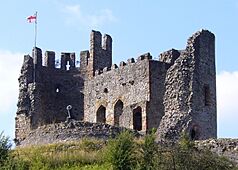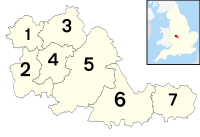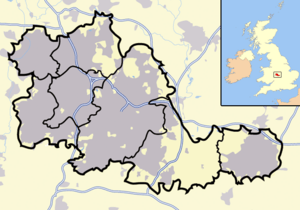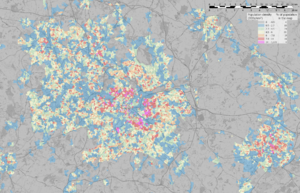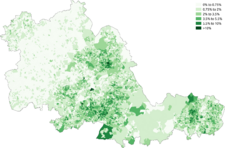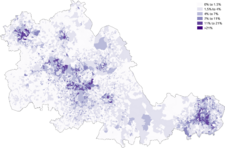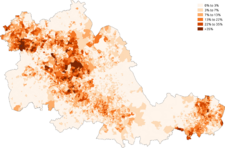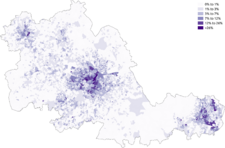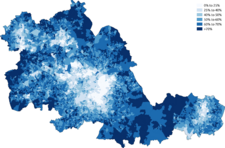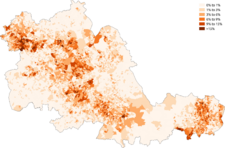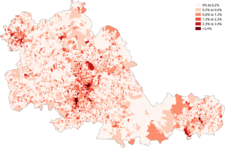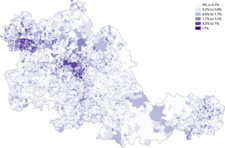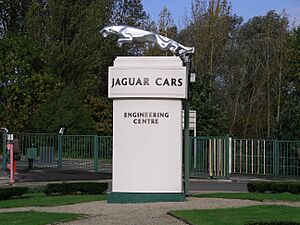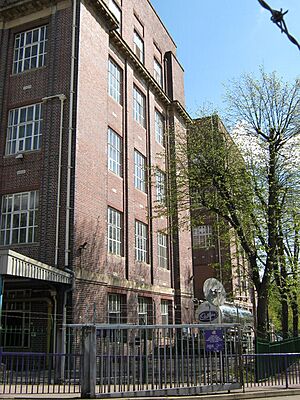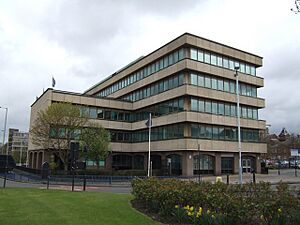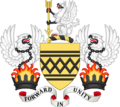West Midlands (county) facts for kids
Quick facts for kids
West Midlands
|
|||||||||||||||||||||||||||||||||||||||||
|---|---|---|---|---|---|---|---|---|---|---|---|---|---|---|---|---|---|---|---|---|---|---|---|---|---|---|---|---|---|---|---|---|---|---|---|---|---|---|---|---|---|
|
|
|||||||||||||||||||||||||||||||||||||||||
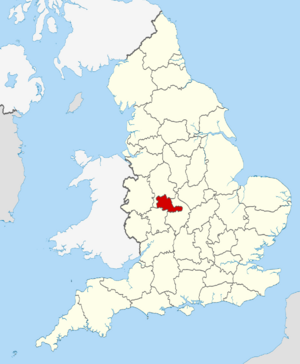
West Midlands within England
|
|||||||||||||||||||||||||||||||||||||||||
| Sovereign state | United Kingdom | ||||||||||||||||||||||||||||||||||||||||
| Constituent country | England | ||||||||||||||||||||||||||||||||||||||||
| Region | West Midlands | ||||||||||||||||||||||||||||||||||||||||
| Established | 1 April 1974 | ||||||||||||||||||||||||||||||||||||||||
| Established by | Local Government Act 1972 | ||||||||||||||||||||||||||||||||||||||||
| Time zone | UTC±00:00 (Greenwich Mean Time) | ||||||||||||||||||||||||||||||||||||||||
| • Summer (DST) | UTC+01:00 (British Summer Time) | ||||||||||||||||||||||||||||||||||||||||
| Members of Parliament | 28 MPs | ||||||||||||||||||||||||||||||||||||||||
| Police | West Midlands Police | ||||||||||||||||||||||||||||||||||||||||
|
|||||||||||||||||||||||||||||||||||||||||
The West Midlands is a county in the middle of England. It is a "metropolitan county," meaning it is mostly made up of cities and towns. The county is surrounded by other counties like Staffordshire, Worcestershire, and Warwickshire.
The largest city in the West Midlands is Birmingham. The county is almost entirely urban, covering about 902 square kilometers (348 square miles). It is home to over 2.9 million people, making it the second most populated county in England after Greater London. Other big cities and towns include Coventry, Wolverhampton, Walsall, and Solihull. Most of the county's towns are part of a large urban area called the West Midlands conurbation. However, there's a rural area called the 'Meriden Gap' between Birmingham and Coventry.
For local government, the West Midlands is divided into seven areas called metropolitan boroughs. These are Birmingham, Coventry, Dudley, Sandwell, Solihull, Walsall, and Wolverhampton. These boroughs work together through the West Midlands Combined Authority. Historically, parts of the county belonged to Staffordshire, Warwickshire, and Worcestershire.
The western part of the county has the River Tame and its smaller rivers. The highest point nearby is Turners Hill, which is 271 meters (889 feet) high. The West Midlands also has Sutton Park, a very large urban park covering 970 hectares (2,400 acres). It is one of the biggest urban parks in Europe.
Contents
How the West Midlands is Governed
The West Midlands is a county by law. It is also a "ceremonial county," which means it has special officials like a Lord Lieutenant and a High Sheriff. These roles are mostly for ceremonies and traditions.
From 1974 to 1986, the West Midlands County Council managed the county. This council was later removed in 1986. After that, the seven local boroughs became responsible for most local services.
The West Midlands Combined Authority
In June 2016, a new group called the West Midlands Combined Authority was created. This group helps manage things like transport, economic growth, and planning across the county. Since May 2017, this authority has been led by a Mayor of the West Midlands, who is chosen by the people. The current mayor is Richard Parker. Other important county-wide services include the West Midlands Police and the West Midlands Fire Service.
Understanding the Name
The name "West Midlands" can sometimes be confusing. It refers to this specific county, but also to a much larger region of England. This larger region includes other counties like Shropshire and Herefordshire. The West Midlands county is located on the eastern side of this bigger region.
A Look at West Midlands History
The West Midlands county as we know it today was only created in 1974. However, the towns and cities in this area have been important for a very long time. They have always been centers for business and industry.
Early Beginnings and Industry
In the Middle Ages, Coventry was a very important city in England. It became rich from making wool and cloth. Birmingham and Wolverhampton have been industrial centers since the 1500s. Back then, small metal-working businesses started there. Birmingham was known for making small weapons. Wolverhampton became famous for making locks and working with brass.
The Black Country area, which is part of the West Midlands, had lots of coal and iron. This made it easy for industries to grow. The area grew very quickly during the Industrial Revolution. By the 1900s, it had become one big urban area. Coventry developed a bit later. By the early 1900s, it was a key place for making bicycles and cars.
How the County Was Formed
In 1974, a new law created the metropolitan county of West Midlands. This new county brought together seven main areas: Birmingham, Coventry, Dudley, Sandwell, Solihull, Walsall, and Wolverhampton. Before 1974, these areas were part of different counties like Warwickshire, Staffordshire, and Worcestershire.
The 1974 changes also created the West Midlands County Council. This council was in charge of big decisions for the whole area. A new police force, the West Midlands Police, was also formed for the entire county.
West Midlands Geography
The West Midlands is a landlocked county, meaning it has no coastline. It shares borders with Warwickshire to the east, Worcestershire to the south, and Staffordshire to the north and west.
Urban and Rural Areas
The West Midlands county is one of the most urbanized areas in the UK. Birmingham, Wolverhampton, the Black Country, and Solihull form a very large urban area. This area is the third most populated urban area in the United Kingdom.
However, the West Midlands is not completely urban. Coventry is separated from the main urban area by a stretch of green land. This area is called the "Meriden Gap" and is about 13 miles wide. It still feels very rural. There is also a smaller green area between Birmingham, Walsall, and West Bromwich. This area includes Barr Beacon and the Sandwell Valley.
Hills and Rivers
The highest point in the West Midlands is Turners Hill. It stands 271 meters (889 feet) tall. This hill is also a special scientific site. Barr Beacon is another hill, located between Birmingham and Walsall, and is 227 meters (745 feet) high.
The county has 23 Sites of Special Scientific Interest. One of these is Sutton Park in Sutton Coldfield. It covers 970 hectares (2,400 acres), making it one of Europe's largest urban parks. It is also a national nature reserve.
Many rivers flow through the county. The River Tame is a major one. Its river basin is the most urbanized in the UK. The River Tame is joined by other rivers like the River Rea, River Anker, and River Blythe. The River Sowe and River Sherbourne flow through Coventry. The River Stour flows through the western part of the county.
Local Boroughs and Cities
Like other metropolitan counties, the West Midlands is divided into seven areas called metropolitan boroughs. Six of these boroughs are named after their largest town or city. The West Midlands is special because three of its boroughs have "city status": Coventry, Birmingham, and Wolverhampton.
| Metropolitan borough | Main Town | Other Towns | |
|---|---|---|---|
| City of Birmingham | Birmingham | Aston, Bournville, Edgbaston, Erdington, Great Barr, Hall Green, Handsworth, Harborne, Northfield, Quinton, Soho, Sutton Coldfield | |
| City of Coventry | Coventry | Allesley, Binley, Keresley, Stoke, Tile Hill | |
| Dudley | Dudley | Amblecote, Brierley Hill, Coseley, Cradley, Gornal, Halesowen, Kingswinford, Lye, Netherton, Sedgley, Stourbridge, Quarry Bank | |
| Sandwell | Oldbury | Bearwood, Blackheath, Cradley Heath, Great Bridge, Old Hill, Rowley Regis, Smethwick, Tipton, Tividale, Wednesbury, West Bromwich | |
| Solihull | Solihull | Balsall Common, Bickenhill, Castle Bromwich, Chelmsley Wood, Dorridge, Elmdon, Hampton in Arden, Kingshurst, Knowle, Marston Green, Meriden, Monkspath, Hockley Heath, Shirley | |
| Walsall | Walsall | Aldridge, Birchills, Bloxwich, Brownhills, Darlaston, Leamore, Palfrey, Pelsall, Pheasey, Shelfield, Streetly, Willenhall | |
| City of Wolverhampton | Wolverhampton | Bilston, Blakenhall, Bushbury, Compton, Ettingshall, Heath Town, Oxley, Penn, Tettenhall, Wednesfield | |
People of the West Midlands
The West Midlands is a diverse place with people from many different backgrounds. The table below shows how the population has changed over the years.
| Ethnic Group | Year | |||||||||||
|---|---|---|---|---|---|---|---|---|---|---|---|---|
| 1966 estimations | 1971 estimations | 1981 estimations | 1991 census | 2001 census | 2021 census | |||||||
| Number | % | Number | % | Number | % | Number | % | Number | % | Number | % | |
| White: Total | – | – | 2,580,903 | 93.2% | 2,371,072 | 88.7% | 2,237,135 | 85.1% | 2,043,231 | 80% | 1,793,173 | 61.4% |
| White: British | – | – | – | – | – | – | – | – | 1,956,156 | 76.5% | 1,630,823 | 55.9% |
| White: Irish | – | – | – | – | – | – | – | – | 54,011 | 2.1% | 31,490 | 1.1% |
| White: Gypsy or Irish Traveller | – | – | – | – | – | – | – | – | 2417 | |||
| White: Roma | – | – | – | – | – | – | – | – | 4246 | |||
| White: Other | – | – | – | – | – | – | – | – | 33,064 | 1.3% | 124,197 | 4.3% |
| Asian or Asian British: Total | – | – | – | – | 206,289 | 7.7% | 276,162 | 10.5% | 352,288 | 13.8% | 667,315 | 22.9% |
| Asian or Asian British: Indian | – | – | – | – | 118,101 | 4.4% | 148,320 | 5.6% | 157,062 | 6.1% | 226,927 | 7.8% |
| Asian or Asian British: Pakistani | – | – | – | – | 65,985 | 2.5% | 93,426 | 3.6% | 138,007 | 5.4% | 278,837 | 9.6% |
| Asian or Asian British: Bangladeshi | – | – | – | – | 11,006 | 0.4% | 19,131 | 0.7% | 29,085 | 1.1% | 72,168 | 2.5% |
| Asian or Asian British: Chinese | – | – | – | – | 4,543 | 0.2% | 6,119 | 0.2% | 10,548 | 0.4% | 22,718 | 0.8% |
| Asian or Asian British: Other Asian | – | – | – | – | 6,654 | 9,166 | 17,586 | 66,665 | 2.3% | |||
| Black or Black British: Total | – | – | – | – | 80,412 | 3% | 96,384 | 3.7% | 95,234 | 3.7% | 236,047 | 8.1% |
| Black or Black British: African | – | – | – | – | 3,602 | 0.1% | 4,134 | 0.2% | 10,000 | 0.4% | 126,041 | 4.3% |
| Black or Black British: Caribbean | – | – | – | – | 63,597 | 2.4% | 75,612 | 2.9% | 76,386 | 3% | 81,732 | 2.8% |
| Black or Black British: Other Black | – | – | – | – | 13,213 | 16,638 | 0.6% | 8,848 | 0.3% | 28,274 | 1% | |
| Mixed: Total | – | – | – | – | – | – | – | – | 54,757 | 2.1% | 121,685 | 4.2% |
| Mixed: White and Black Caribbean | – | – | – | – | – | – | – | – | 31,525 | 1.2% | 59,903 | 2.1% |
| Mixed: White and Black African | – | – | – | – | – | – | – | – | 2,446 | 9,735 | ||
| Mixed: White and Asian | – | – | – | – | – | – | – | – | 12,641 | 28,872 | ||
| Mixed: Other Mixed | – | – | – | – | – | – | – | – | 8,145 | 23,175 | ||
| Other: Total | – | – | – | – | 15,327 | 0.5% | 19,719 | 0.7% | 10,082 | 0.4% | 101,435 | 3.5% |
| Other: Arab | – | – | – | – | – | – | – | – | – | – | 28,083 | 1% |
| Other: Any other ethnic group | – | – | – | – | – | – | – | – | 10,082 | 0.4% | 73,352 | 2.5% |
| Ethnic minority: Total | 102,850 | – | 188,306 | 6.8% | 302,027 | 11.3% | 392,265 | 14.9% | 512,361 | 20% | 1,126,482 | 38.6% |
| Total | – | 100% | 2,769,209 | 100% | 2,673,099 | 100% | 2,629,400 | 100% | 2,555,592 | 100% | 2,919,655 | 100% |
- Distribution of ethnic groups in the West Midlands according to the 2011 census.
- Distribution of religions in the West Midlands according to the 2011 census.
West Midlands Economy
The West Midlands is a hub for many different businesses and industries. From car manufacturing to food processing, many companies have their base here.
Major Industries and Companies
The region is well known for making cars. Land Rover has a main factory in Solihull. Jaguar Cars also has a large plant in Castle Bromwich Assembly. They make luxury cars like the XJ, XF, and XK models.
Food and drink companies are also important. Cadbury's main chocolate factory and Cadbury World are in Bournville, Birmingham.
Many other businesses operate in the West Midlands. These include:
- J Hudson & Co, the world's largest maker of whistles.
- Dunlop Aircraft Tyres, which makes and repairs aircraft tires.
- Severn Trent, a large water company.
- Poundland, a well-known discount retailer.
- 2 Sisters Food Group, one of Britain's largest chicken processors.
Fun Places to Visit in the West Midlands
The West Midlands has many exciting places to visit for all ages. You can explore history, enjoy nature, or have fun at entertainment venues.
Museums and Historic Sites
- Black Country Living Museum, Dudley: This outdoor museum shows what life was like in the Black Country during the Industrial Revolution.
- Coventry Transport Museum: See a huge collection of cars, bicycles, and motorcycles.
- Birmingham Museum & Art Gallery: Discover art, history, and natural science.
- Dudley Castle: Explore the ruins of a historic castle and visit the zoo next door.
- Blakesley Hall, Birmingham: A beautiful Tudor house that shows life from hundreds of years ago.
- Sarehole Mill, Birmingham: A working watermill with links to author J.R.R. Tolkien.
Parks and Nature
- Birmingham Botanical Gardens: Enjoy beautiful plants and flowers from around the world.
- Sandwell Valley Country Park, West Bromwich: A great place for walking, cycling, and seeing wildlife.
- West Park, Wolverhampton: A Victorian park with lakes, gardens, and sports facilities.
- Winterbourne Botanic Garden, Birmingham: Another lovely garden to explore.
Entertainment and Shopping
- Cadbury World, Bournville, Birmingham: Learn about chocolate and enjoy tasty treats.
- Birmingham Bullring: A huge shopping center with many stores.
- Merry Hill Shopping Centre, Dudley: Another large shopping destination.
- National Exhibition Centre (NEC): A major venue for events, concerts, and exhibitions.
- Sea Life Centre, Birmingham: See amazing sea creatures up close.
- Star City: A large entertainment complex with a cinema, restaurants, and activities.
Sports Venues
- Edgbaston Cricket Ground, Birmingham: Home to Warwickshire County Cricket Club and hosts international matches.
- Villa Park (Aston Villa Football Club): The stadium for Aston Villa.
- Molineux Stadium (Wolverhampton Wanderers F.C.): The home ground for Wolverhampton Wanderers.
- The Hawthorns (West Bromwich Albion Football Club): The stadium for West Bromwich Albion.
- Bescot Stadium (Walsall F.C.): The home of Walsall Football Club.
- Coventry Building Society Arena (Coventry City Football Club): The stadium for Coventry City.
Learning and Education
The West Midlands is home to many universities and colleges, offering lots of opportunities for learning.
Universities in the West Midlands
There are ten universities in the county. Seven of them are in Birmingham:
- Aston University
- University of Birmingham
- Birmingham City University
- University College Birmingham
- BPP University
- University of Law
- Newman University
Coventry University and the University of Warwick are both located in Coventry. The University of Wolverhampton has campuses in Wolverhampton, Telford, and Walsall.
Schools and Colleges
Each local area in the West Midlands has at least one college for students over 16. Since 1992, most schools have followed a system where children attend infant schools (ages 5-7), junior schools (ages 7-11), and then secondary schools (ages 11-16/18).
Many secondary schools still have sixth form facilities, where students can continue their education after age 16. However, some areas have moved towards students attending separate further education colleges instead. Most state secondary schools in Dudley and Sandwell are mixed-gender comprehensive schools. Some single-sex or grammar schools can be found in Birmingham, Solihull, Wolverhampton, and Walsall.
In 2009, Matthew Boulton College and Sutton Coldfield College merged to become Birmingham Metropolitan College. This is now one of the largest further and higher education colleges in the country.
Media and Communication
The West Midlands has its own television and radio stations, keeping everyone informed and entertained.
Television Channels
The area is served by BBC West Midlands and ITV Central. Both of these channels broadcast from Birmingham. There is also a local television station called TalkBirmingham. Television signals are received from the Sutton Coldfield TV transmitter.
Radio Stations
For local radio, you can listen to BBC Radio WM and BBC CWR (for Coventry).
There are also many commercial radio stations, including:
- Free Radio
- Capital Midlands
- Heart West Midlands
- Hits Radio Coventry & Warwickshire
- Smooth West Midlands
- Greatest Hits Radio Birmingham & The West Midlands
- Greatest Hits Radio Black Country & Shropshire
Community radio stations, run by local people for local people, include:
- The Bridge 102.5 (Stourbridge)
- Big City Radio (Birmingham)
- Radio Plus and Hillz FM (Coventry)
- WCR FM and Gorgeous Radio (Wolverhampton)
- Black Country Radio (Black Country)
Sports in the West Midlands
The West Midlands is a very sporty county, with many professional and amateur teams.
Rugby
In rugby union, there are several clubs like Wasps RFC, Sutton Coldfield RFC, Moseley Rugby Football Club, and Coventry RFC. For rugby league, the Midlands Hurricanes are the county's professional team, playing in the third tier.
Football
The West Midlands is home to six professional football teams that play in the Premier League and Football League. Two of these, Aston Villa and Wolverhampton Wanderers, play in the top league, the Premier League. These six clubs are often called the West Midlands "Big Six":
| Club | League | City/town | Stadium | Capacity |
|---|---|---|---|---|
| Aston Villa | Premier League | Birmingham | Villa Park | 42,788 |
| Wolverhampton Wanderers | Premier League | Wolverhampton | Molineux | 31,700 |
| Birmingham City | League One | Birmingham | St Andrew's | 30,079 |
| West Bromwich Albion | Championship | West Bromwich | The Hawthorns | 26,500 |
| Coventry City | Championship | Coventry | Coventry Building Society Arena | 32,609 |
| Walsall | League Two | Walsall | Bescot Stadium | 11,300 |
Other Sports
Warwickshire County Cricket Club is based at Edgbaston Cricket Ground in Birmingham. This ground also hosts major international cricket matches. The Birmingham Panthers basketball team plays at a facility in Walsall.
The West Midlands even has its own Quidditch team, called the West Midlands Revolution. They won the Quidditch Premier League in 2017!
Images for kids
See also
 In Spanish: Tierras Medias Occidentales para niños
In Spanish: Tierras Medias Occidentales para niños
 | Bessie Coleman |
 | Spann Watson |
 | Jill E. Brown |
 | Sherman W. White |



